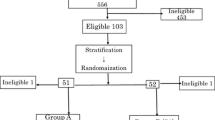Abstract
Objective: We studied the ability of human lung-cancer-specific cytotoxic T lymhocytes to suppress the growth of human lung adenocarcinoma (PC-9) engrafted in severe combined immunodeficiency mice. Methods: PC-9-specific cytotoxic T lymhocytes were generated by multiple stimulation with irradiated PC-9 cells of regional lymph node lymphocytes from lung cancer patients expressing the same human leukocyte antigen-A locus haplotype as PC-9 following expansion due to the administration of immobilized anti cluster of differentiation 3 mAb and interleukin-2. Cytotoxic T lymhocytes showed specific cytotoxicity against PC-9 cells in vitro. Severe combined immunodeficiency mice with a subcutaneous graft of PC-9 were treated with a PC-9-specific cytotoxic T lymhocyte by i.V. injection and/or with interleukin-2 by s.c. injection. Results: Cytotoxic T lymhocyte treatment suppressed PC-9 graft growth significantly an effect, significantly enhanced when combined with interleukin-2 injection. To evaluate the in vivo specificity of anti-PC-9 cytotoxic T lymhocytes, each mouse was subcutaneously inoculated in the right flank with PC-9, and in the left flank with A549 or Sq-1. Cytotoxic T lymhocytes plus interleukin-2 treatment was found to suppress PC-9 growth selectivly, but not A549 or Sq-1 growth. Conclusions: These results provide sufficient rationale for conducting further clinical trials on immunotherapy using cytotoxic T lymhocyte for lung cancer patients.
Similar content being viewed by others
References
Grimm EA, Mazumder A, Zhang HZ, Rosenberg SA. Lymphokine-activated killer cell phenomenon lysis of natural killer-resistant fresh solid tumor cells by interleukin-2 activated autologous human peripheral blood lymphocytes. J Exp Med 1982; 155: 823–41.
Rosenberg SA, Lotze MT, Muul LM, Leitman S, Chang AE, Vetto JT, et al. A new approach to therapy of cancer based on the systemic administration of autologous lymphokine-activated killer cells and recombinant IL-2. Surgery 1986; 100: 262–72.
Mazumder A, Rosenberg SA. Successful immuno-therapy of natural killer-resistant established pulmonary metastases by the intravenous adoptive transfer of syngeneic lymphocytes activated in vitro by interleukin-2. J Exp Med 1984; 159: 495–507.
Mule JJ, Shu S, Schwartz SL, Rosenberg SA. Adoptive immunotherapy of established pulmonary metastases with LAK cells and recombinant interleukin-2. Science 1984; 225: 1487–9.
Rosenberg SA, Lotze MT, Muul LM, Chang AE, Avis FP, Leitman S, et al. A progress report on the treatment of 157 patients with advanced cancer using lymphokine-activated killer cells and interleukin-2 or highdose interleukin-2 alone. New Engl J Med 1987; 316: 889–97.
Rosenberg SA, Lotze MT, Yang JC, Aebersold PM, Linehan WM, Seipp CA, et al. Experience with the use of high-dose inter leukin-2 in the treatment of 652 cancer patients. Ann Surgery 1989; 210: 474–85.
Lotze MT, Chang AE, Seipp CA, Simpson C, Vetto JT, Rosenberg SA. High-dose recombinant interleukin-2 in the treatment of patients with disseminated cancer. Responses, treatment-related morbidity, and histologic findings. JAMA 1986; 256: 3117–24.
Belldegrun A, Muull M, Rosenberg SA. Interleukin-2 expanded tumor-infiltrating lymphocytes in human renal cell cancer: isolation, characterization, and antitumor activity. Cancer Res 1988; 48: 206–14.
Kradin RL, Boyle LA, and Preffer FI. Tumor-derived interleukin-2 dependent lymphocytes in adoptive immunotherapy of lung cancer. Cancer Immunol Immunother 1989; 24: 76–85.
Rosenberg SA, Spiess P, Lafreniere R. A new approach to the adoptive immunotherapy of cancer with tumor infiltrating lymphocytes. Science 1986; 233: 1318–21.
Topalian SL, Solomon D, Avis FP. Immunotherapy of patients with advanced cancer using tumor-infiltrating lymphocytes and recombinant interleukin-2: a pilot study. J Clin Oncol 1988; 6: 839–53.
Sabzevari H, Reisfeld RA. Human cytotoxic T-cells suppress the growth of spontaneous melanoma metastases in SCID/hu mice. Cancer Res 1993; 53: 4933- 37.
Saitoh S, Kurisaka M, Mori K, Maeda N, Fujimoto S. Induction of specific cytotoxic T lymphocytes against autologous brain tumor by cross-reactive Allo-tumor cell stimulation. Jpn J Cancer Res 1997; 88: 289–95.
Yoshino I, Takenoyama M, Fujie H, Hanagiri T, Yoshimatsu T, Imabayashi S, et al. The induction of cytotoxic T lymphocytes against HLA-A locus-matched lung adenocarcinoma in patients with non-small cell lung cancer. Jpn J Cancer Res 1997; 88: 743–9.
Nakao M, Yamada H, Imai Y, Toh U, Kimura A, Yanoma S, et al. HLA A2601-restricted CTLs recognize a peptide antigen expressed on squamous cell carcinoma. Cancer Res 1995; 55: 4248–52.
Mazumder A, Rosenberg SA. Successful immunotherapy of natural killer-resistant established pulmonary metastases by the intravenous adoptive transfer of syngeneic lymphocytes activated in vitro by interleukin-2. J Exp Med 1984; 159: 495–507.
Lafreniere R, Rosenberg SA. Successful immunotherapy of murine experimental hepatic metastases with lymphokine activated killer cells and recombinant interleukin-2. Cancer Res 1985; 45: 3735–41.
Yano T, Ishida T, Yoshino I, Murata M, Yasumoto K, Kimura G, et al. A regimen of surgical adjuvant immunotherapy for cancer with interleukin 2 and lymphokine-activated killer cells. Biother 1991; 3: 245–51.
Hanagiri T, Yoshino I, Takenoyama M, So T, Fujie H, Imabayashi S, et al. Effects of Interleukin-12 on the induction of cytotoxic T lymphocytes from the regional lymph node lymphocytes of patients with lung adenocarcinoma. Jpn J Cancer Res 1998; 89: 192–8.
Author information
Authors and Affiliations
Rights and permissions
About this article
Cite this article
Imahayashi, S., Yoshino, I., Eifuku, R. et al. Adoptive immunotherapy using specific cytotoxic T lymphocytes against human lung-cancer-engrafted severe combined immunodeficiency mice. Jpn J Thorac Caridovasc Surg 48, 166–172 (2000). https://doi.org/10.1007/BF03218115
Received:
Accepted:
Issue Date:
DOI: https://doi.org/10.1007/BF03218115




